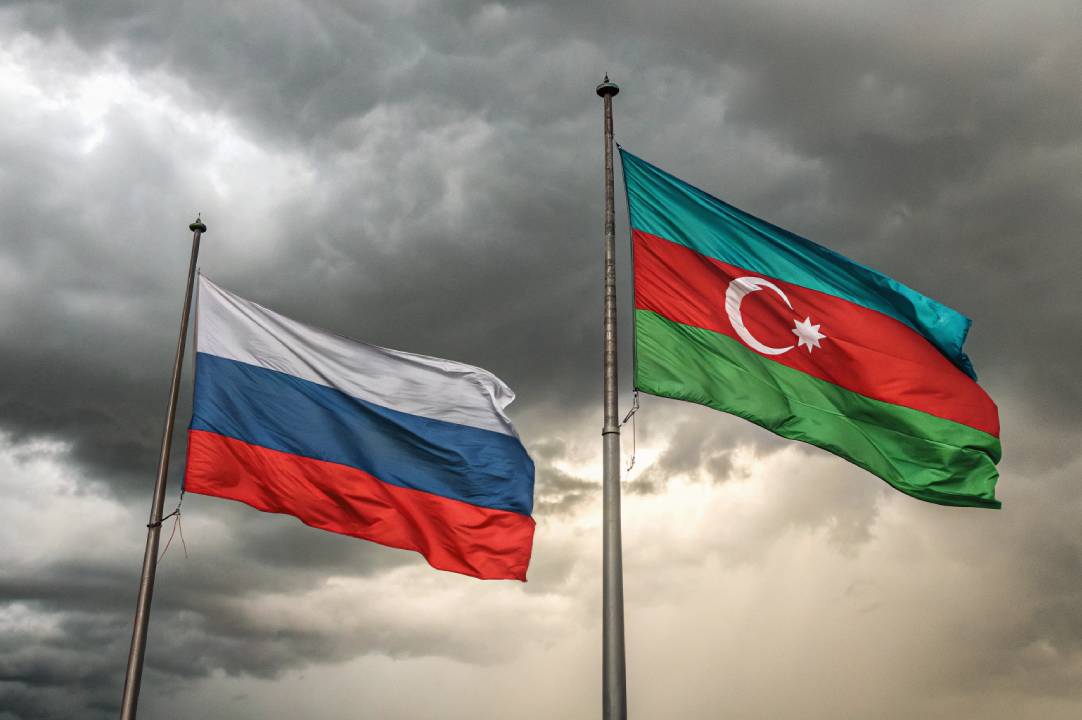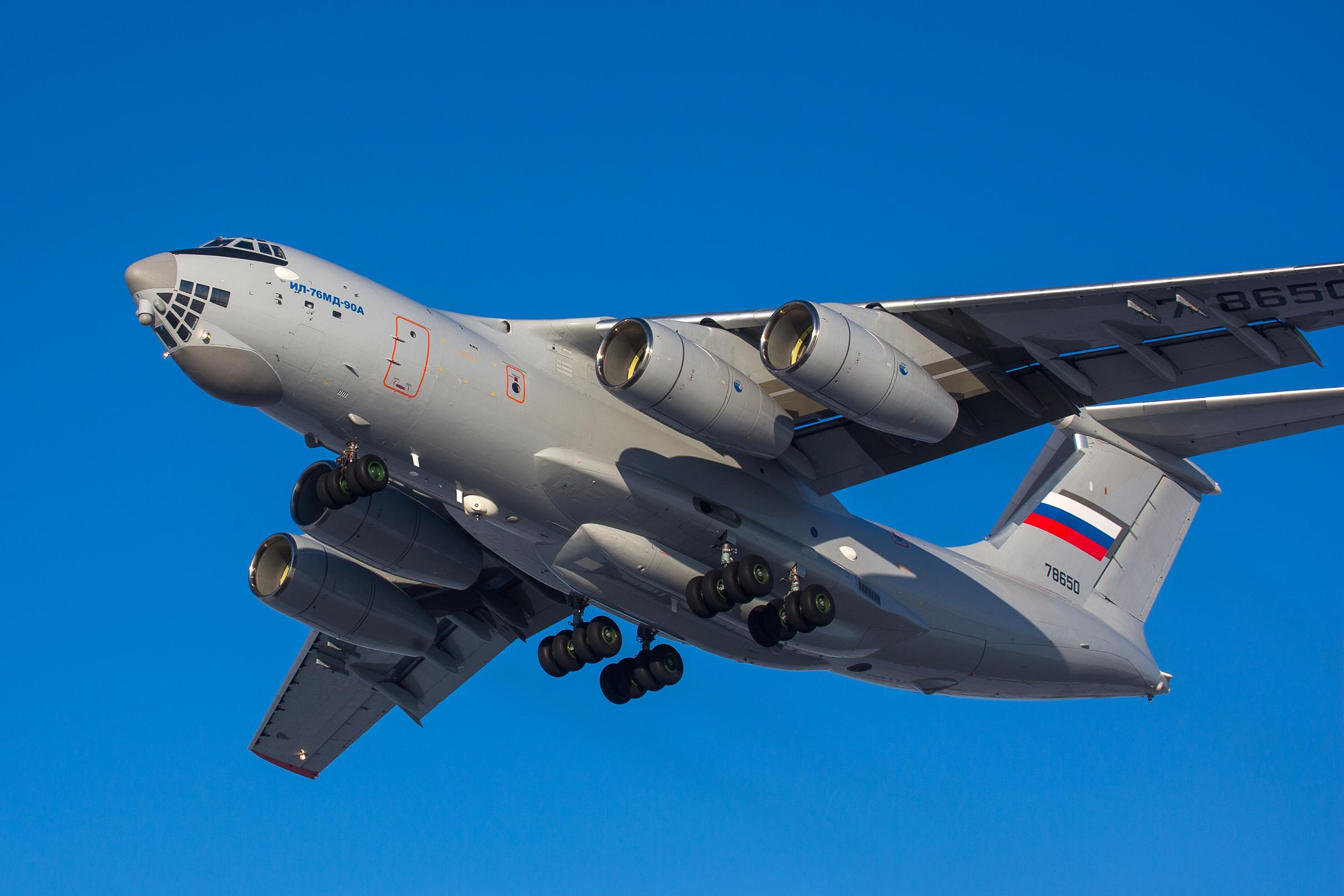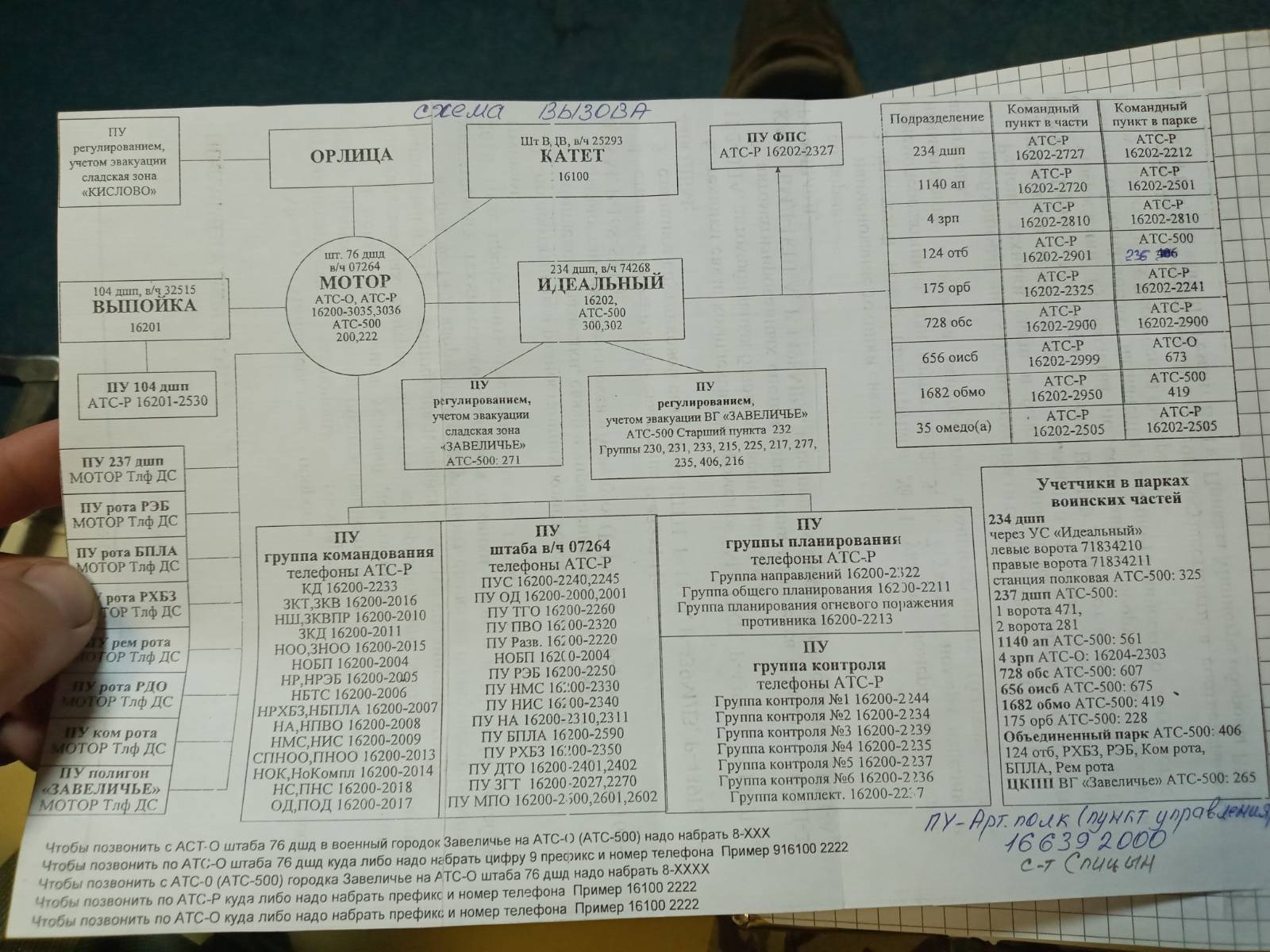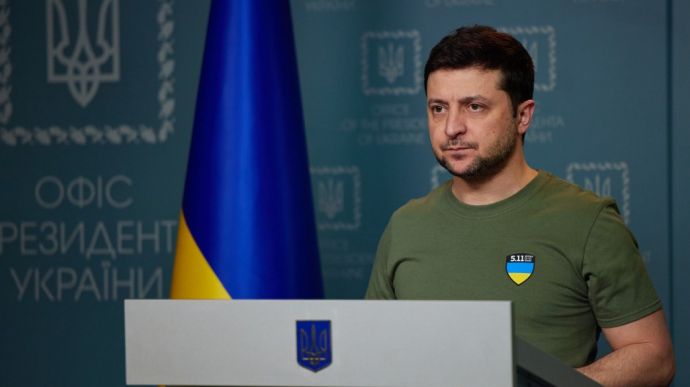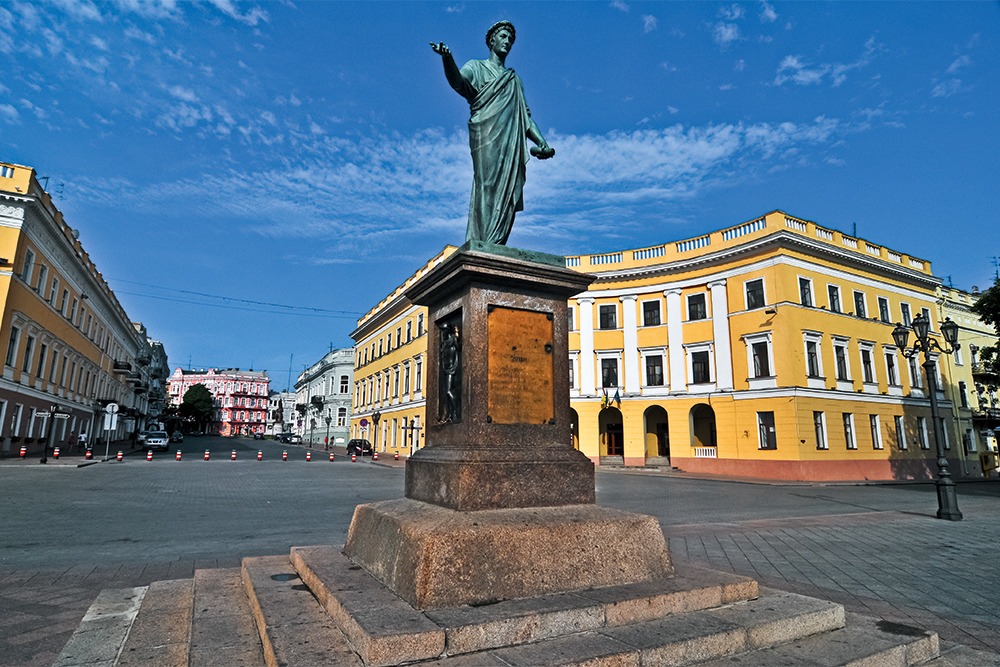When Allies Become Liabilities: Russia’s Iran Dilemma
Nothing epitomizes the desperation of fading empires quite like Russia’s recent Middle East theater of errors. During the 12-day Israel-Iran war in June 2025, as Israeli and American forces systematically dismantled Iran’s nuclear infrastructure and military capabilities. Moscow’s supposedly 20-year “strategic” partnership with Tehran proved to be little more than diplomatic theater. Instead of honoring commitments to its crucial supporter who had been supplying drones for Russia’s brutal war in Ukraine since 2022, Moscow cowered in silence, offering only empty rhetoric about “de-escalation.”

Photo of Ali Motahari: Iranwire.com
This stunning betrayal didn’t go unnoticed in Tehran. Ali Motahari, the Islamic Republic’s former deputy parliament speaker, publicly excoriated Russia for its double standards: “Russia has supplied S-400 air defense systems to Türkiye and Saudi Arabia. But it does not provide these systems to Iran, which has helped it with drones in the war with Ukraine”. The irony was palpable – while Iran faced existential threats to its nuclear program, Russia was more concerned about maintaining cordial relations with Israel than protecting its supposed ally.
The Art of Diplomatic Humiliation
Russia’s dwindling influence on the global stage was on full display when President Vladimir Putin contacted U.S. President Donald Trump, proposing to mediate a ceasefire between Israel and Iran, and was bluntly told to keep his nose out of it and focus on his own affairs. Namely, on extricating Russia from its hapless war against Ukraine mired with military setbacks, high casualties of more than 1000 soldiers daily, and huge economic toll.
The ceasefire that ended the 12-day conflict was ultimately brokered by the United States with Qatar’s mediation, completely sidelining Russia despite its proclaimed ties with Iran. This wasn’t mere oversight – it was a calculated exclusion that demonstrated Moscow’s diminished standing on the global stage. French President Emmanuel Macron further twisted the knife, publicly stating that Russia lacked both “credibility and legitimacy” for such a role.
From Strategic Partner to Scapegoat: The Yekaterinburg Atrocity
Russia’s frustration with its Middle East failures manifested in ugly ways closer to home. Realizing that Iran was unhappy with Moscow’s lack of support during the conflict, the Kremlin decided to demonstrate its “reliability” through a particularly vicious display of ethnic targeting of the South Caucasus nation.
Directing its pressure toward Azerbaijan was no coincidence. During the height of the June 2025 hostilities, Iranian officials accused Israel of using Azerbaijani airspace – especially routes near the Caspian Sea – to launch strikes on Iranian military and nuclear facilities. Baku flatly rejected these claims, calling them baseless. But the narrative provided the Kremlin with a convenient pretext for retribution under the guise of law enforcement.
On June 27, 2025, Russian Federal Security Service (FSB) forces conducted raids in Yekaterinburg – the administrative center of Sverdlovsk Oblast, roughly 1,400 kilometers east of Moscow, ostensibly investigating a 25-year-old murder case.

Photo of the funeral: azertag.az
The result was the brutal killing of two Azerbaijani brothers, Ziyaddin and Huseyn Safarov, whose deaths Russian authorities initially blamed on “heart failure” until Azerbaijani autopsy results revealed they had been beaten to death, suffering “post-traumatic and post-hemorrhagic shock as a result of multiple serious bodily injuries“.
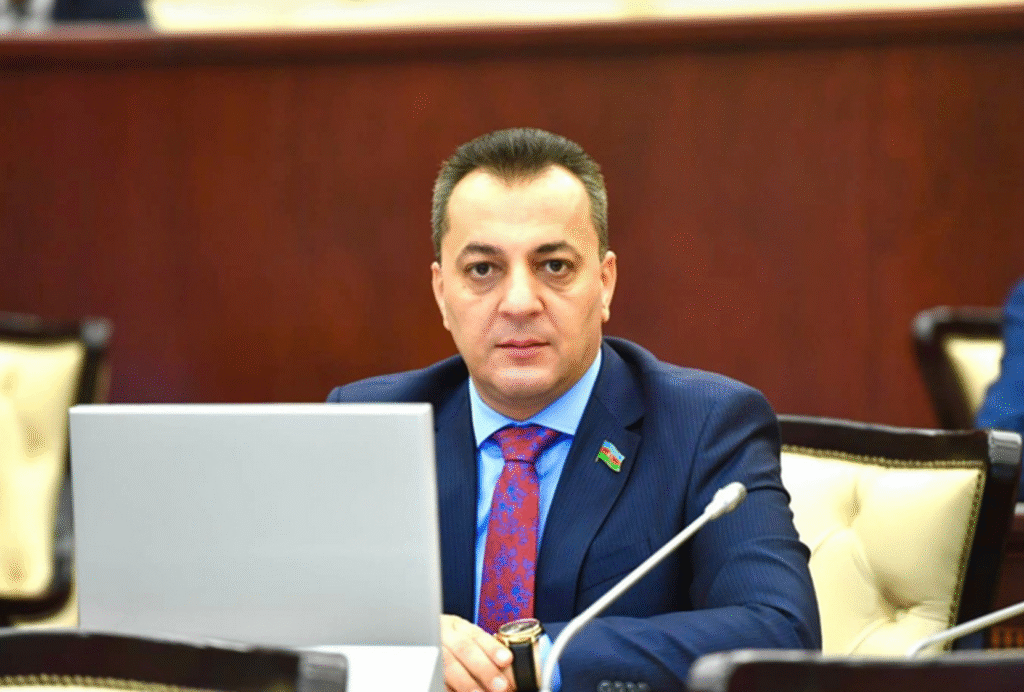
Photo of Vugar Iskandarov: apa.az
Azerbaijani MP Vugar Iskandarov didn’t mince words about such tactics: “The regime led by President Vladimir Putin has long turned racist and imperialist approaches into state policy. This is not merely a trend – it is the core ideological pillar of the new Putinism.” The transformation of “ultra-nationalism and chauvinistic, Islamophobic politics of fear” into “official tools of the Russian state” represents a dangerous escalation in Moscow’s playbook, he warned.
Analysts continue to debate the underlying motives behind Moscow’s sudden escalation against Azerbaijan. One theory points to a veiled warning to Baku’s closest ally, Turkish President Recep Tayyip Erdoğan, who has publicly criticized the Russian S-400 air defense system as inadequate for Türkiye’s national security. By orchestrating a brutal crackdown against Azerbaijani civilians, the Kremlin may have been signaling its willingness to strike indirectly at Ankara through its regional partners.
Another possible factor is geopolitical humiliation. The Kremlin has never forgotten the blow to its prestige when it stood aside as Azerbaijan decisively defeated Armenia – Russia’s nominal ally – in the Second Karabakh War. This latest act of violence may well be a delayed form of “payback,” rooted not in strategy but in wounded imperial pride.
The Azerbaijan Airlines Cover-Up: A Pattern of Deception
The Yekaterinburg killings weren’t Russia’s first act of aggression against Azerbaijan. On December 25, 2024, Azerbaijan Airlines Flight 8243 was shot down by a Russian Pantsir-S1 air defense system near Grozny, killing 38 of 67 passengers and crew. Moscow’s initial response followed a depressingly familiar pattern: aggressive denial, absurd alternative explanations (including claims of “bird strikes”), and furious demands that Azerbaijan “shut up”.
The truth eventually emerged through painstaking investigation when Pantsir S-1 missile fragments were discovered inside the wreckage, definitively proving Russian culpability. On 1 July 2025, Azerbaijani media Minval.az added more evidence to the case publishing a testimonial from the Pantsir-S1 captain Dmitri Paladichuk claiming that the AZAL plane was shot down by the order of Russian Defense Ministry.
Information Warfare and Espionage: The Sputnik Scandal

Photo of arrested Sputnik Azerbaijan personell: eadaily.com
The escalating tensions culminated in Azerbaijan’s dramatic raid on Russian propaganda operations. On June 30, 2025, Azerbaijani police stormed the Baku offices of Sputnik Azerbaijan – a Russian state-funded media outlet long suspected of subversive activity. Seven individuals were arrested, including two Russian nationals: Executive Director Igor Kartavykh and Editor-in-Chief Yevgeny Belousov. The operation revealed that despite having its accreditation revoked in February 2025, Sputnik had continued functioning through “illegal financing” and suspected Russian Federal Security Service connections. The pattern extends across Europe: in 2023, Latvian security services detained Marat Kasem, editor-in-chief of Sputnik Lithuania, on espionage charges, while Moldova deported the head of Sputnik Moldova citing “a threat to the country’s information security”. These incidents point to a wider Russian strategy of using state-controlled media as fronts for espionage and information warfare across sovereign states.
In this context, Milli Majlis – national legislature of Azerbaijan, issued a formal statement condemning what it described as a coordinated Russian disinformation effort. According to lawmakers, this offensive against Azerbaijan and Azerbaijanis living in Russia by various news channels and individuals on state-controlled Russian media and the Telegram channels began shortly after the Yekaterinburg killings. The case underscores Russia’s broader playbook of hybrid destabilization – where propaganda, espionage, and coercive influence tactics go hand in hand.
Regional Realignment: The Zangezur Corridor and Russia’s Exclusion
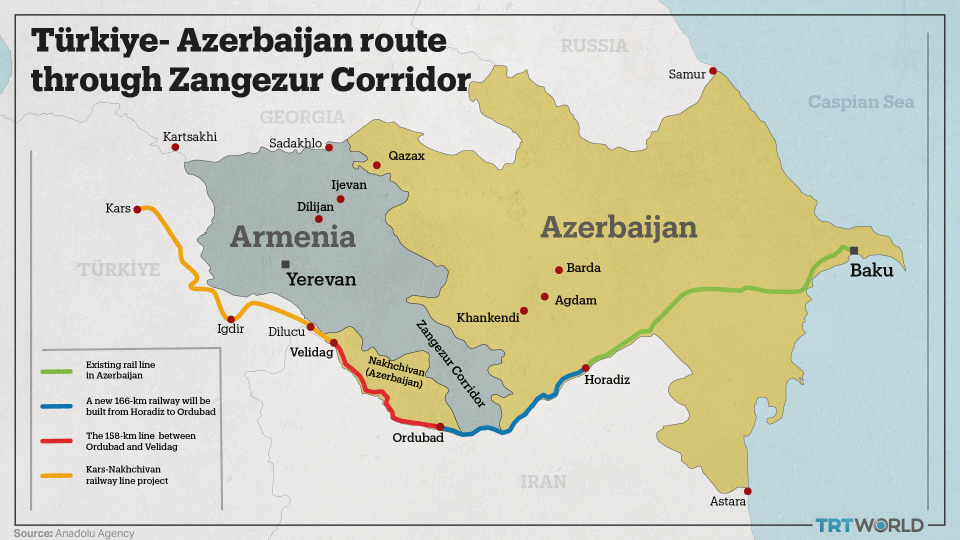
Illustration: Anadolu Agency
The most significant long-term consequence of Russia’s declining influence may be emerging in the South Caucasus transportation networks. Multiple sources indicate that Turkey, Azerbaijan, and Armenia are nearing an agreement on the Zangezur Corridor – a proposed transport route connecting Azerbaijan’s mainland with its Nakhchivan exclave through Armenia’s Syunik Province. Armenian Prime Minister Nikol Pashinyan’s historic visit to Turkey on June 20, 2025, reportedly discussed this potential deal, which would exclude Russia from controlling the corridor.
This development represents a fundamental shift in regional geopolitical alignment within a remarkably short timeframe. The corridor would not only enhance connectivity between Turkey and Azerbaijan but also facilitate trade between Europe and Central Asia while deliberately sidelining Russian influence over this critical South Caucasus transit pathway.
Conclusion: The Anatomy of Decline
Russia’s Middle East failures expose the fundamental weakness underlying Putin’s supposedly resurgent empire. The regime that once claimed to be restoring Russian greatness has instead demonstrated its transformation into an increasingly isolated, brutal, and unreliable actor on the world stage. When push came to shove, Moscow proved unable or unwilling to defend its most important regional ally, instead resorting to ethnic violence against civilians and clumsy propaganda operations.
The cooperation between Azerbaijan and Armenia, facilitated by Turkish mediation, threatens to deprive Iran of its Armenian leverage in the region while simultaneously reducing Russia’s influence over both countries. As these regional realignments accelerate, Putin’s Russia finds itself increasingly confined to partnerships with fellow pariah states – North Korea, Iran (when convenient), and Belarus – while its former sphere of influence slips away. Although China remains a key global player and partner to Russia, it is careful to maintain its own strategic interests without fully aligning with Moscow’s more isolated and erratic trajectory.
The irony is inescapable: in seeking to restore Russian imperial glory through force and intimidation, Putin has instead accelerated its decline, transforming Russia from a great power into a dangerous but diminishing spoiler whose word means nothing and whose friendship proves worthless when truly put to the test.
